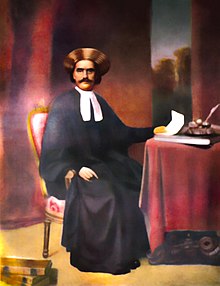| Sambhunath Pandit | |
|---|---|
 | |
| Born | 1820 (1820) Calcutta, Bengal Presidency, Company Raj |
| Died | 6 June 1867 (1867-06-07) (aged 46) Calcutta, Bengal Presidency, British India |
| Occupations |
|
Sambhunath Pandit (1820–1867) was the first Indian to become judge of Calcutta High Court in 1863. He served in that position from 1863 to 1867.
Son of Sadasiv Pandit, he belonged to a Kashmiri Pandit family. He was brought up in Bhowanipur, Kolkata. As a child, he went to Lucknow to study Urdu and Persian. On return to Kolkata, he joined the Oriental Seminary.
Active life
He was a founder member of British Indian Association.
Bhowanipur Brahmo Samaj
In the History of the Brahmo Samaj, Sivanath Sastri writes, "In the month of June 1852, a number of influential men of that suburban town (meaning Bhowanipur) assembled at the house of the late Sambhunath Pandit, latterly a Judge of Calcutta High Court, and established an Association under the name of Jnan Prakasika Sabha, or "Truth Revealing Society", whose object it was to promote the spiritual enlightenment of its members. It was virtually a Brahmo Samaj, though the name was different. Sambhunath Pandit became its president, Babu Annadaprasad Banerjee, a pleader of the High Court, vice-president, and Baboo Harishchandra Mukherji of the Hindu Patriot fame its secretary... From the first anniversary of the Society held in 1853, it was duly and formally installed as Bhowanipur Brahmo Samaj." It followed the Adi Samaj form of divine service.
He published a book entitled On the Being of God.
A government hospital and an important road in Bhowanipur are named after him.
References
- Cotton, H.E.A., Calcutta Old and New, 1909, p. 576, General Printers and Publishers Pvt. Ltd.
 This article incorporates text from this source, which is in the public domain.
This article incorporates text from this source, which is in the public domain.
- ^ Sengupta, Subodh Chandra and Bose, Anjali (editors), 1976/1998, Sansad Bangali Charitabhidhan (Biographical dictionary) Vol I, (in Bengali), p. 508, ISBN 81-85626-65-0.
- Sastri, Sivanath, History of the Brahmo Samaj, 1911-12, pp378-379, Sadharan Brahmo Samaj, 211 Bidhan Sarani, Kolkata.
 This article incorporates text from this source, which is in the public domain.
This article incorporates text from this source, which is in the public domain.
- In his Civic and Public Services in Old Calcutta, P. Thankappan Nair writes, "The Government had also started a public dispensary in Bhabanipur in 1840. In 1896, it was moved to a commodious new building (provided by the Corporation) and renamed the South Suburban Hospital. In 1898, it became Shambhunath Pandit Hospital after the first Indian judge at the Calcutta High Court. Calcutta: The Living City, Volume I, edited by Sukanta Chaudhuri, p. 229, Oxford University Press, ISBN 0-19-563696-1.
- Scholars from Kolkata
- Brahmos
- 1820 births
- 1867 deaths
- Oriental Seminary alumni
- University of Calcutta alumni
- Indian social workers
- Indian social reformers
- Indian lawyers
- Indian jurists
- 19th-century Indian judges
- 20th-century Indian writers
- 20th-century Indian male writers
- Indian religious writers
- Social workers from West Bengal
- Judges of the Calcutta High Court